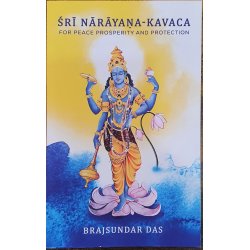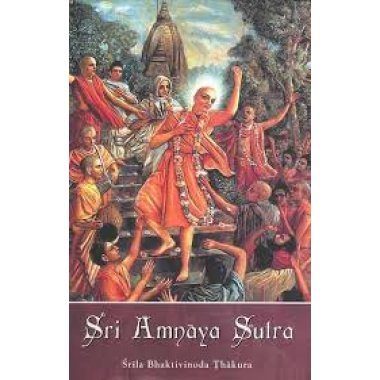Latest Products
Sri Amnaya Sutra
by Srila Bhaktivinoda Thakura, 293 pages, Hardbound
$6.50
Commentary by Srila Bhaktivinoda Thakura
In the Aitareya Upanishad (3.1.2) it is said:
yad etad dhridayam manas caitat samjnanam ajnanam vijnanam prajnanam medha drishtir
dhritir manisha jutih smritih sankalpah kratur asuh kamo vasa iti. sarvany evaitani prajnanasya namadheyani bhavanti.
"The heart, mind, knowledge, perception, wisdom, discrimination, intelligence, vision, patience, thoughtfulness, action, memory, will, talent, reflection, desire, and control are the various parts of wisdom."
In the Agni Purana it is said:
vairagyadir manah khedo
nirveda iti kathyate
"Renunciation is defined as that condition where the mind is no longer passionate to enjoy the things of this world."
Srila Rupa Gosvami (Sri Bhakti-rasamrita-sindhu 2.4.4-6) explains:
nirvedo 'tha vishado dainyam
glani-sramau ca mada-garvau
sanka-trasa-vega unmadapasmriti
tatha vyadhih
moho mritir alasyam
jadyam vridavahittha ca
smritir atha vitarka-cintamati-
dhritayo harsha utsukatvam ca
augryamarshasuyas
capalyam caiva nidra ca
suptir bodha itime bhava
vyabhicarinah samakhyatah
"There are some bodily symptoms that express overwhelming ecstatic love (vyabhicari-bhava). They are counted at thirty-three as follows: disappointment, lamentation, humility, guilt, fatigue, intoxication, pride, doubt, apprehension, intense emotion, madness, forgetfulness, disease, confusion, death, laziness, inertness, bashfulness, concealment, remembrance, argumentativeness, anxiety, thoughtfulness, endurance, happiness, eagerness, violence, haughtiness, envy, impudence, dizziness, sleepiness, and alertness."*
Sutra 109
bhakti-raso hi maya-gandha-sunya-paramartha-sva-rupa-gata-cid-vaicitryam
The rasas of devotional service are free from the slightest scent of maya (the illusory potency of matter). They are a great wonder of spiritual variety. They are the greatest treasure.
Commentary by Srila Bhaktivinoda Thakura
In the Brihad-aranyaka Upanishad (4.4.21) it is said:
tam eva dhiro vijnaya
prajnam kurvita brahmanah
nanudhyayad bahn cchabdad
vaco viglapatam hi tat
"A wise brahmana will use his intelligence to understand the Supreme Personality of Godhead. He will not study other things. Other topics are a waste of words."
In the Gopala-tapani Upanishad (1.5-6) it is said:
sakalam param brahmaivaitad. yo dhyayati rasayati bhajati so 'mrito bhavati. so 'mrito bhavati.
"The Supreme Personality of Godhead is everything. One who meditates on Him, glorifies Him, and worships Him, and thus enjoys the nectar of transcendental bliss, becomes immortal. He becomes immortal."
In Srimad-Bhagavatam (10.87.23) it is said:
nibhrita-marun-mano-'ksha-dridha-yoga-yujo hridi yanmunaya
upasate tad arayo 'pi yayuh smaranat
striya uragendra-bhoga-bhuja-danda-visakta-dhiyo
vayam api te samah sama-driso 'nghri-saroja-sudhah
"Great sages, by practicing the mystic yoga system and controlling the breath, conquer the mind and senses. Thus engaging in mystic yoga and seeing the Supersoul within their hearts, they ultimately enter into the impersonal Brahman along with the enemies of the Supreme Personality of Godhead. However, the damsels of Vraja, the gopis, want to embrace Krishna and His arms, which are like serpents. Being attracted by the beauty of Krishna, the gopis ultimately tasted the nectar of the lotus feet of the Lord. The Upanishads have also tasted the nectar of His lotus feet by following in the footsteps of the gopis."*
Srila Rupa Gosvami (Sri Bhakti-rasamrita-sindhu 2.5.131) explains:
sarvathaiva duruho 'yam
abhhaktair bhagavad-rasah
tat-padambuja-sarvasvair
bhaktir evanurasyate
"Nondevotees cannot understand the transcendental mellows experienced between the devotee and the Lord. In all respects this is very difficult, but one who has dedicated everything to the lotus feet of Krishna can taste the transcendental mellows."* Srila Rupa Gosvami (Sri Bhakti-rasamrita-sindhu 2.5.112) also explains:
paramananda-tad-atmyad
raty-ader asya vastutah





